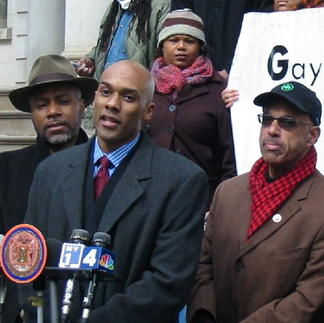How to Enlighten America: An Interview with Keith Boykin
- Victoria A. Brownworth
- Dec 1, 2021
- 9 min read
Updated: Mar 4, 2022
December 1, 2021 COVER STORY QueerForty.com
He’s Black, he’s gay, and he’s the one political analyst you need to listen to right now.

As we end another tumultuous year, journalist, author, and cultural critic Keith Boykin can shed light on some of America’s darkest and most persistent problems, discussing topics exclusively with Queer Forty, such as the Kyle Rittenhouse verdict; the fraught racial divide in America propelled by Donald Trump and the GOP; what it’s like to be a visible Black gay Gen X man in America at this political and social crossroads during a pandemic, and how white allyship demands more than just protesting.
Boykin has been quietly making history for several decades as an out gay Black man in the predominantly straight white world of mainstream U.S. politics. One can track the changes or lack thereof in the acceptance of both Black and queer leadership in those politics by what Boykin has done over the 35 years since he was an undergraduate at Dartmouth, an Ivy League college that even today has only four percent Black enrollment.
After graduating from Dartmouth in 1987, Boykin worked on the presidential campaign of Massachusetts Gov. Michael Dukakis. When Dukakis lost the election, Boykin went on to law school and it was there that he came out as a gay man and began focusing his activism, as he detailed in his 1996 book One More River to Cross: Black & Gay in America.
Boykin’s time at Harvard Law School was also defined by progressive politics and activism. He was general editor of the Harvard Civil Rights-Civil Liberties Law Review and an on-campus leader of the diversity movement at the university. His subsequent work on the Bill Clinton 1992 presidential campaign in Little Rock, Arkansas led to his position in the Clinton White House where he took an activist role. Clinton appointed Boykin Special Assistant to the President and Director of Specialty Media. As the then-highest-ranking openly gay person in the Clinton White House, Boykin helped organize
and participated in the nation’s first meeting between gay and lesbian leaders and a U.S. president, making LGBTQ history.
As a political commentator for CNN since 2017, Boykin is a familiar face discussing the impact of racism in America, particularly as it was emboldened under Donald Trump’s presidency. The politics of race and racism is a subject of all his books, but none so declaratively and provocatively as his latest book, Race Against Time: The Politics of a Darkening America.
In this new work, Boykin pulls no punches. White people are scared of an America that doesn’t look as much like them as it used to: An America that has already had a Black president and now a Black and Asian vice president. An America in which the demographics of several states are more Black and brown than white. An America in which the 2020 U.S. Census found four in ten Americans identify as a race other than white. An America where one of the two major political parties has only three Black members of Congress and where that party is working statewide to limit voting access for Black and brown Americans.
Boykin is succinct, noting how the anti-mask and anti-vax movement is connected to this white grievance that is also anti-LGBTQ grievance — the same people who are against Critical Race Theory are also banning LGBTQ books in school libraries.

Photo: Eastern Michigan University
Boykin says, “They blame the elites, the people that are perceived as elites. They blame a certain group of people—the people who tell them to accept trans kids in their schools, who say women have a right to control their own bodies, to accept same-sex marriage, to be nice to Black people.”
When we spoke with Boykin, the Kyle Rittenhouse trial and the trial of the three men accused of killing Ahmaud Arbery were winding down. We opened our conversation asking Boykin to talk about those trials and what they meant in a larger context, given that Rittenhouse had gone to a Black Lives Matter protest with an AR-15 rifle to, as his defense attorneys claimed, “protect property,” but where the then-17-year old Rittenhouse had killed two protesters and permanently disabled a third who he had wounded.
Boykin said that “these trials put American justice on trial.” He cited the biases on the part of Judge Schroeder in the Rittenhouse trial and said that both trials had illumined “the bias of the American public—at least conservatives” against Black Americans.
“Look at the disparities,” he said. “Trayvon Martin—an unarmed teen in his own neighborhood—was 17, like Kyle Rittenhouse. Look at the way Trayvon was portrayed in the media and [at the George Zimmerman] trial. There is a huge disparity in how we treat Black children versus white children in this country.”
Boykin said that “Black children like Trayvon are demonized and white children [like Rittenhouse] are valorized for things that Black children could never get away with.”
As for 25-year-old Ahmaud Arbery, Boykin said, “Arbery was a Black man in a particular place where Black people were not supposed to be. The presence of Blackness in and of itself is intimidating to white people.”

Photo: Keith Boykin
Boykin explains that this is the premise of his new book. “In my book I look at this changing America,” he said. “And it becomes clear—the more white people feel threatened and aggrieved that they are losing ground, losing dominance, the more they lash out.” He quotes Emory University professor and writer Dr. Carol Anderson: “The trigger for white rage is black progress.”
One of the ways that white rage is reflected in mainstream politics, Boykin says, is with creating “more barriers and hurdles for Black and brown voters and rigging the Census.” He adds that in Texas people with gun licenses can vote but people with a valid student ID can’t. “It’s pernicious and deliberate,” he said.
The voting issue should be paramount for everyone. And as LGBTQ people are keenly aware, the GOP is trying to invalidate LGBTQ rights at the state level and as Queer Forty has previously explored, Black queer voices are historically suppressed and as a consequence rarely get heard.
Boykin says we have a Democratic president, House and Senate, and that there are three dominant issues that should be paramount for the party: The John Lewis Justice in Policing Act, the Emmett Till Act and the Voting Rights Act. “I haven’t heard the president talking about [these acts],” Boykin said. “I still haven’t seen the Democrats pushing for this. The Justice Department hasn’t come out about this.”
Boykin does point out that “there are things the Biden-Harris administration has done that have helped Black and brown people: the American Rescue Plan, the Child Tax Credit, the infrastructure bill. And Build Back Better will help even more. Biden even helped black farmers, which is way overdue.” But he also adds that while those things are good, “everyone should want voting rights.” He points out that “in the Senate in 2006 the vote for voting rights was 98-0. In 2006. What happened?”
The shifting demographics and the blatantly racist Trump happened. Boykin says it wouldn’t surprise him if Trump tried to run for president again. “He doesn’t understand the gravity of his crimes. Or what he did during the pandemic.” He adds, “I don’t think Donald Trump cares about politics. He cares about his ego. And that’s a dangerous thing, to put all that power and responsibility in the hands of someone like that. We have to be very careful.”








Comments